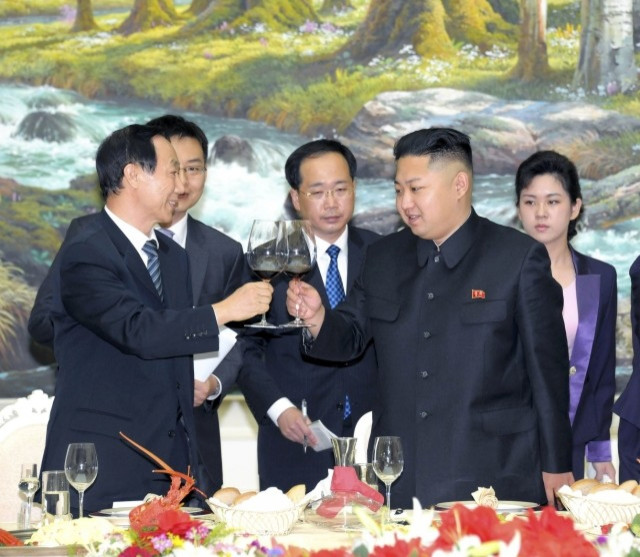North Korea, Desperate For Foreign Aid, Calls On An Old Ally

Kim Jong-un held his first publicly known high-level meeting with foreign diplomats on August 2. No surprise, the visitors were from China.
The Chinese delegation, led by Wang Jiarui, the head of the Communist Party's international department (essentially in charge of liaisoning with other communist parties in foreign countries) were in Pyongyang to meet with the North Korean supreme leader and high ranking members of the Korean Worker's Party (KWP).
Kim was joined by vice-marhsal Choe Ryong-hae, a member of the KWP political presidium and vice-chairman of the Central Military Commission. Also in attendance was Kim's uncle-in-law Jang Song-taek, the vice-chairman of the more powerful National Defense Council (second only to Kim's own position). Jang was thought to serve as something of a regent between the transfer of power from Kim Jong-il and Kim Jong-un. Many North Korea watchers still consider him to be the true power behind the current regime.
The arrival of the Chinese visitors, at a critical moment when North Korea is facing a series of natural disasters, is leading to speculation that Pyongyang is again seeking food and material assistance from Beijing.
Flooding at the end of July in North Korea has reportedly left 119 dead and around 63,000 homeless, though accurate estimates are always difficult to obtain from the isolated country. The floods, caused by heavy rains and typhoons, came after weeks of crippling drought, the worst on the Korean Peninsula for over a century. The United Nations said in late June that some 3 million residents in the North, or one-eighth of the population, were in need of urgent food aid.
On Friday, North Korea requested that the UN release emergency supplies of food and fuel to help it alleviate the current environmental crisis.
Experts surmise that in the coming months Kim Jong-un may make a trip himself to Beijing in order to meet with Chinese leaders and seek new economic support. Whether this would occur before or after China's own leadership transition, expected in October or November, is uncertain.
Kim Jong-un told the visiting Chinese that "developing the economy and improving livelihoods, so that the Korean people lead happy and civilized lives, is the goal the Korean Workers' Party is struggling towards."
At face value, that seemed a further indication of a new direction being forged by the young North Korean leader, who has so far defined himself in state media as a populist with more openness and emotion than his father, Kim Jong-il. That is raising expectations and hopes that the regime will make gradual steps to economic opening as well, though few signs of those more meaningful policies have emerged so far.
But Kim's comments may also be specially phrased to appease the ears of Chinese leaders, who pushed Kim's father for years to open up the country and follow Beijing's own wildly successfully model of economic growth.
North Korea's past resistance to that path, and its antagonization of neighbors South Korea and Japan, has caused China diplomatic headaches and worsened its relations with those two key economic partners, who see China as a major backer to a troublesome and dangerous state. Chinese citizens themselves, especially of the younger generation who did not grow up during the era of Communist solidarity in the Cold War, are increasingly voicing their own opposition to the vast amounts of money spent to prop up Pyongyang.
Beijing remains leery of withdrawing support from resource-starved North Korea, concerned that doing so would result in regime collapse and possibly millions of refugees streaming northward into China.
Yet sometimes, it is hard to see who's really dictating the terms of the relationship. North Korea's state Korea Central News Agency said in a statement about the visit on August 2, that Wang had "expressed deep condolences on the demise of leader Kim Jong Il, a close friend and teacher of the Chinese people."
What "teachings" KCNA and Wang were specifically referring to is unknown.
Wang's visit also coincides with the arrival of other political delegations in Pyongyang to meet with the young North Korean leader. Ricardo Alemao Abreu, the international relations secretary of the Brazilian Communist Party, and Michael Luther, a Christian Democratic Union member of the German Parliament, also visited Pyongyang on Friday.
Kim Jong-un has urged citizens and Korean Worker's Party members to study the example of his father's patriotism in order to overcome the country's crushing poverty and economic backwardness, saying in late July that "the country will emerge as a thriving socialist nation when the hot wind of learning from Kim Jong Il's patriotism prevails and all the people fully embody it into practice."
U.S. refusal to send food assistance to North Korea, a reaction against the North's backtracking in nuclear negotiations and its widely-opposed rocket launches, is controversial among non-government organizations who say it unduly punishes the masses but leaves regime leaders unaffected.
The North's state-run Rodong Sinmun (Labor News) called the U.S. "a kingpin of international plot-breeding operations and terrorism" on Friday.
© Copyright IBTimes 2024. All rights reserved.





















